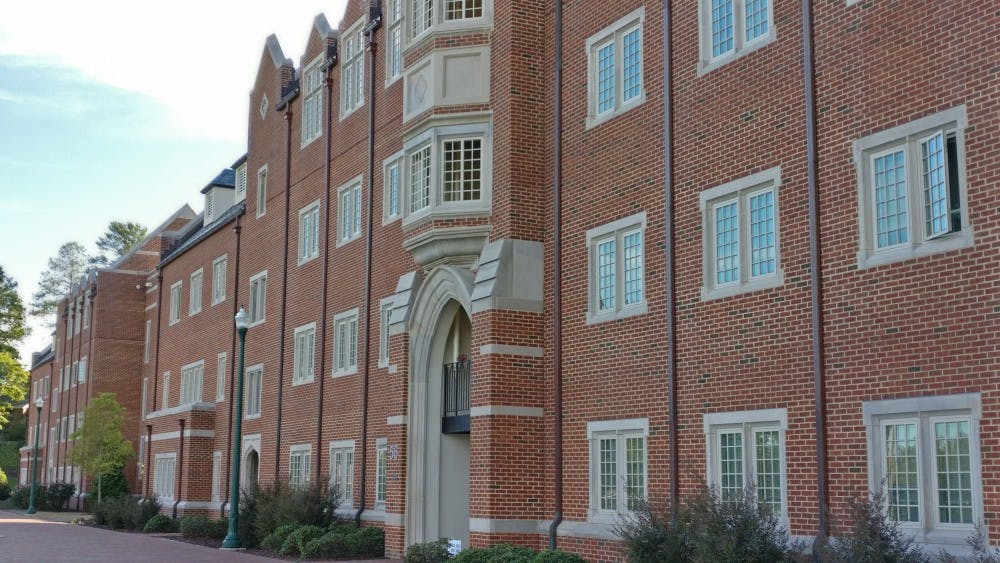Spring 2017 marked the first time that a sophomore, junior or senior at the University of Richmond could apply to live together regardless of biological sex, gender identity or gender expression.
Gender-flexible housing for upperclassmen was first announced in October 2016. Patrick Benner, director of residence life and undergraduate housing, said 40 students have since chosen the option.
Except for a few mentions of uncertainty at the start of the new school year, students have not reported any major difficulties with their gender-flexible housing arrangements, Benner said.
Kristina Rossi, WC’18, said she had been asked by her friend, Kobie Crosley, RC
“This is the best sense of community I’ve ever felt in a living space,” Rossi said.
Crosley agreed, saying that he loves his current apartment situation and has not yet faced any complications.
“I feel as though our apartment dynamic is so much healthier than if I were to live with all men,” Crosley said. “Our group is just such a great balance of people that I don't know if I could be more content with how it turned out.”
Rossi, Crosley and their roommates live in the University Forest Apartments. Students had to apply for gender-flexible housing in groups of three or four depending on if they were living in an apartment or residence hall, Benner said.
The gender-flexible housing application was separate from UR’s regular StarRez housing application. Those interested could apply through OrgSync, which pulled them out of the general housing selection process to be assigned a specific living arrangement, Benner said.
Benjamin Cook, RC’18, had been friends with his current roommates since their first year. Once gender-flexible housing was offered, they finally got the chance to live together.
Cook identifies as a gay man and lives with three female students in UFA, yet he has not noticed any difference between living with them instead of living with male students.
“No differences,” Cook said. “Living with your friends is living with your friends.”
Enjoy what you're reading?
Signup for our newsletter
One of Cook’s roommates, Alison Schaffir, WC’18, also said that she has not noticed any glaring changes.
“It’s been very natural,” Schaffir said. “I always joke that I almost don’t even notice that we’re in gender-flexible housing because these people have been my close friends since freshman year.”
Schaffir said she had worried at first that the living arrangement would be hardest for Cook, as he was the only male roommate. After hearing Cook say he truly felt comfortable being himself while living with her, however, Schaffir said her uncertainty went away.
“It doesn’t even feel like there’s a gender barrier,” Schaffir said. “It’s just people that are kind of sharing the same values and interests and commonalities that are all in one space together.”
According to the October 2016 Collegian article, the feeling of increased inclusivity and addressing the restriction of gendered spaces had been integral goals in the creation process of the gender-flexible housing option.
The program first came from revisiting Common Ground’s review of trans-inclusion policies from 2012, which showed that, at the time, UR lacked a housing policy that addressed the transgender community, Glyn Hughes, director of Common Ground, said.
While all upperclassmen have the option to apply, Hughes said assignments should particularly accommodate transgender students, given limited housing space.
“We do want to make sure that those who are needing it are getting access to it,” Hughes said.
Rossi said she agreed that having gender-flexible housing promoted inclusivity and that her living situation is more balanced because she has been living with male students.
“I think everyone acts a lot more ‘normal’ with a co-ed group, just because you don’t have this high testosterone or high estrogen environment,” Rossi said. “Everyone’s a lot more chill and down-to-earth. There’s no drama at all.”
Although Rossi is happy with her living situation, she said that the option itself and those who could apply for it had not been advertised enough.
“The thing is, people didn’t know about it,” Rossi said. “It wasn’t promoted very well. Every time I tell people I’m living with guys, their response is: ‘Really? You can do that?’ That’s always the response.”
The housing office posted information on its website, announced the option through SpiderBytes and informed relevant staff, such as Resident Assistants, Benner said.
As it currently stands, the formal gender-flexible housing application is not available to incoming first-years because their living arrangements are made through the first-year housing questionnaire, Benner said. But, first-year students who identify as non-binary are encouraged to reach out to the deans of their respective colleges, as well as Hughes, to make sure that their specific needs are met.
The housing office plans to make further improvements by integrating gender-flexible housing as a future option for incoming first-years, Benner said.
Contact news writer Arrman Kyaw at arrman.kyaw@richmond.edu.
Support independent student media
You can make a tax-deductible donation by clicking the button below, which takes you to our secure PayPal account. The page is set up to receive contributions in whatever amount you designate. We look forward to using the money we raise to further our mission of providing honest and accurate information to students, faculty, staff, alumni and others in the general public.
Donate Now



